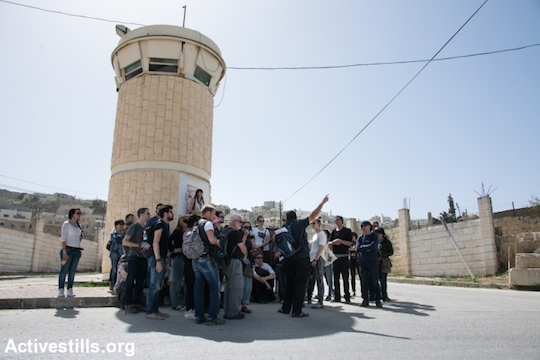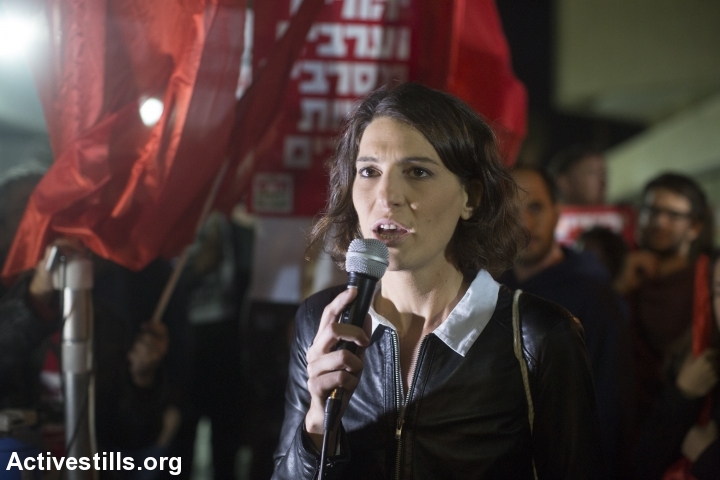Under public pressure, Ben-Gurion University pulled a prize from Breaking the Silence, a group of Israeli soldiers who talk publicly about what it means to serve in an occupying army. The group is ‘outside the consensus,’ the university’s president explained. But if occupation is the consensus, Breaking the Silence says it is proud to be on the outside. The following is a speech delivered by the organization’s executive director at an alternative prize ceremony.
By Yuli Novak
The soldiers who have broken their silence did not do so in a vacuum. The act of breaking one’s silence is not of clearing your conscience or easing the post-trauma of those sent to enforce a military regime over civilians (although it can be a side effect).
The act of breaking one’s silence is not pleasant. Breaking one’s silence is grating, frightening; you lose sleep over it. The point of breaking one’s silence is to radically change the political situation — not cosmetically, but fundamentally, down to the roots.
Breaking one’s silence is taking a personal and moral stance against an unacceptable situation from start to finish, in its totality. Breaking one’s silence is also assuming responsibility for one’s actions and the willingness to pay a personal price for it.
We break our silence in protest of the occupation. Our act of breaking silence is the exclamation that military control over millions of people, Palestinians, for decades, is unacceptable at its core. That the occupation is not something that can or should be normalized or “repaired,” only terminated. Because even though it has existed for decades, it has no right to exist. And breaking one’s silence is to challenge that which has become part of us, and part of our identity, for nearly 50 years now.
The Ben-Gurion University administration said its decision to veto an award granted to Breaking the Silence was based on the fact that we are an organization that is outside the political consensus.
Since the day it was founded, Breaking the Silence has never been part of the national consensus. On the contrary, the act of breaking one’s silence is an act of coming out against the consensus.
Don’t be confused: occupation is the consensus. The soldiers who have broken their silence did so to bring an end to the occupation. They, we, are trying to challenge it. To undermine this mechanism. To disable it. They break their silence and expose what it means to occupy another people — not in theory, not as historical research, not from afar. They were there. And they show us the injustice built in to the implementation of this cruel policy. And they are willing to pay the personal price for this act.
Breaking one’s silence is a right that every citizen has in a democracy, in order to challenge the consensus. To stand facing it, and yell loud and clear that what we have been conditioned to think is a load of crap. It’s a lie. An illusion. It is a horrible policy that only serves a tiny portion of Israeli society: the messianic, settler Right and its representatives in the Knesset.
So, in effect, Professor Carmi and Professor HaCohen and the other members of the administration who chose this consensus argument have not revealed anything new to us. They are right. We are, proudly, outside the consensus.
The combatants who approach Breaking the Silence to give their testimony about what goes on in the territories are freeing themselves — knowingly and purposely — from the warm and comfortable embrace of the consensus. Each and every one of them is breaking his or her silence in order to differentiate itself from the consensus. One by one, testimony after testimony have transformed into a database of thousands of testimonies and stories that for the last 12 years have been exposing the dangers of the consensus.
In light of the hysterical and violent response of the consensus, the act is, apparently, highly effective.
Breaking the Silence will be part of the consensus the day that we win; the day the occupation ends, and a process of rehabilitation and reconciliation begins.
Until then, we have no interest in being part of the consensus. Not because we are interested in being spiteful, but because we have no other choice.
The occupation, this destructive regime, has prevented Israel from functioning as a democracy for 50 years and it is quickly becoming the very definition of who we are.

This means that more and more Israelis are effectively becoming servants of this occupation regime. More and more people — from all walks of life — are forced to take an active part in maintaining and upholding the consensus, primarily against the emerging cracks. Over the last year, I have witnessed this horrible process repeating over and over again.
In this sense, Professor Carmi is aligned with a host of dishonorable people, like Yair Lapid, who has targeted Breaking the Silence in order to find favor with the consensus. Alongside him are members of his party, who criticize him behind the scenes but remain publicly silent. And the same politicians who once led the fight against the occupation remain silent in the face of incitement and violence hurled at us; politicians have told me, with tears in their eyes, that “if they back Breaking the Silence it will cost them in the primaries.”
This list of “noble people,” who prefer to keep their personal opposition to the occupation silent because the price they would have to pay is too high, is growing longer and longer.
And yes, in 2016 Israel, hosting a lecture or awarding a prize to soldiers who have come out openly against the occupation is a brave act; it is not obvious. It is an act that comes with a price. I do not need to have explained to me the price that comes with opposing the consensus. But here is where the real danger lies.
Carmi not only withdrew the award from Breaking the Silence, but also — perhaps without meaning to, maybe without thinking it through too much — helped strengthen the consensus that labels us as traitors and spies. After all, if we weren’t traitors, the award wouldn’t have been taken away. This is the real tragedy: Carmi didn’t withdraw the award because she supports the occupation (though I don’t really know what she supports). And I don’t think she hates Breaking the Silence (she doesn’t really know us at all). She just got scared.
Carmi folded and gave in to the sensational and violent populism of the government of occupation, and the consensus. She accepted the un-democratic rules of the game. She internalized what the leaders of the consensus demand from all of us: don’t oppose it. Don’t give a platform to anyone who criticizes the government’s policies. Don’t obstruct the political echelon from continuing to occupy and settle. And most of all, don’t undermine their raging success at turning the occupation into the national consensus.
Now we can and must say the truth: the people who have enabled the occupation of the Palestinian territories to continue for nearly 50 years now, and to become a national consensus, are not the settlers or their elected officials in the Knesset. It’s not the prime minister either. Those who allow the occupation to prosper are its agents. Those who do not support it, but who nonetheless remain silent. Those who know it endangers the future of Israel, but do not rise up against it. Those who recognize that the occupation contradicts and undermines Israeli democracy, but choose again and again to remain within the consensus.
Having said all this, I would still like to thank Professor Carmi and the university administration: thanks to your decision, the award has become all the more valuable. It has become highly esteemed because in recent months, it exposed many more people to the immense moral perversion taking place here. Your decision mobilized people to come out, bravely, against the tyranny of the consensus.
And it is valuable because it is being awarded to us today by a group of inspiring people who acted out of faith and courage and stood their ground in a way that sets an example, and is a civic role model for us all. Guy, Hagai, Iris, Anat, Amit, Yoni, Oren and many others, I am proud to stand here with you at this moving event. On behalf of Breaking the Silence, I am proud to receive this award that is outside the consensus, that opposes the consensus, that is to the chagrin of the consensus.
Thank You.
Yuli Novak is the executive director of Breaking the Silence. Read this article in Hebrew on Local Call.

